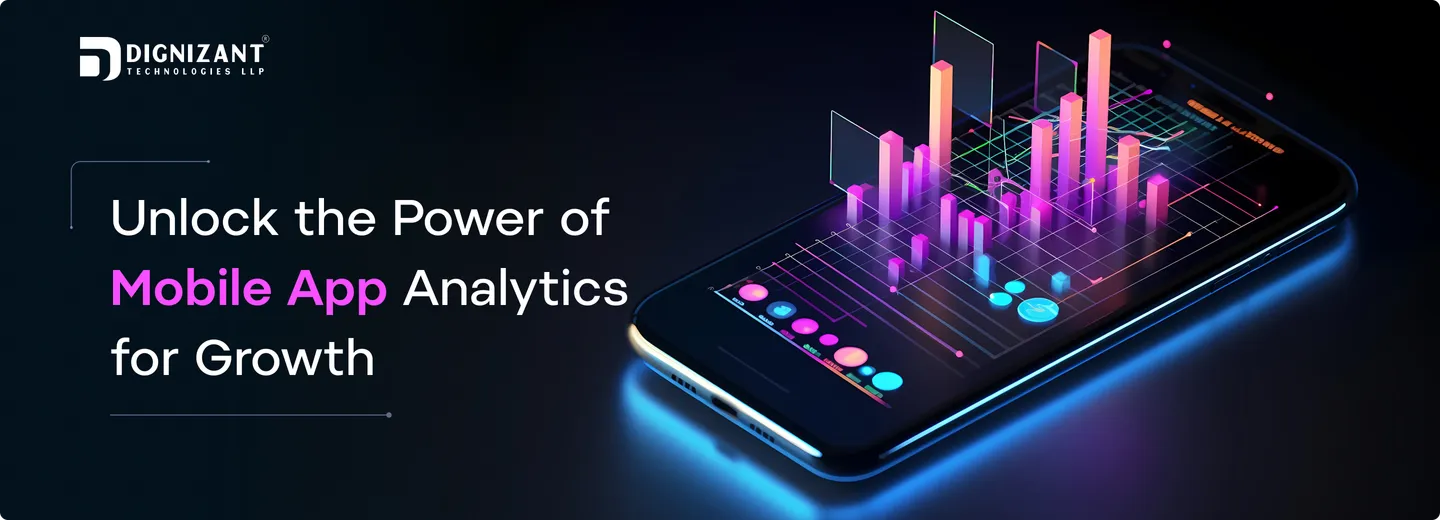Unlock the Power of Mobile App Analytics for Growth

Contributor
Palash Pandya
Uploaded
25 September, 2025
Read Time
5 Minutes
We live in a digital first world, where Mobile Apps are the epicenter of customer engagement. Shopping, banking, gaming and health care apps are the places businesses engage with customers every day. But that is not the end of it success depends on how well you measure your app and improve upon its performance.
This is where Mobile App Analytics comes into play. With the ability to monitor user behavior, retention and engagement, companies can unlock hidden potential, optimize experiences and maximize growth. This is an article on how app analytics enables businesses to survive in a very competitive market.
What is Mobile App Analytics?
Mobile App Analytics the collection, measurement and analysis of data from a mobile application. It offers glimpses into how users engage with an app, from downloads to session times, retention rates and in-app purchases.
Unlike basic performance monitoring, app analytics provides companies with the answers to important questions:
- Are users enjoying the app experience?
- Which features are driving engagement?
- Where do users drop off?
- How can retention rates be improved?
By answering these questions, companies can form apps that delight users and also accomplish concrete business goals.
Why Analytics Matters for App Growth
Just having an app is a start. Growth occurs when businesses know how to refine experiences and change them according to evolving attitudes from people. Analytics matters because it enables:
- Data-driven decisions – Having the facts drive your improvements, not guesses.
- Improved retention – Find out why users are leaving and solve problems fast.
- Revenue optimization – Striking the perfect balance between ads, in-app purchases and subscriptions.
- User satisfaction – Improving the things customers love to use.
App growth is a dark hole without analytics.
Key Metrics to Track in Mobile App Analytics
1. Acquisition Metrics
Monitor where new users are coming from app stores, referrals or adverts on social media. Knowing acquisition channels makes for better marketing investments and higher quality users.
2. Engagement Metrics
Data such as session time, a number of uses and in-app activities will tell you how well your users adopt the app. High engagement means that the app is delivering what users want.
3. Retention and Churn
Retention shows how many users return after their first visit. Churn highlights how many uninstall or stop using the app. These metrics directly impact long term growth and profitability.
4. Revenue Metrics
For monetized apps, tracking in-app purchases, advertising performance and subscription renewal is vital. It enables businesses to maximize the lifetime value of customers.
Role of Mobile Analytics Software
Mobile analytics software businesses use to monitor and analyze performance. There are tools such as these that aggregate data from across sources, visualize user journeys, and give developers clear action items. From diagnosing app crashes to segmenting customer behavior, the right software helps businesses improve technical performance as well as customer satisfaction.
Benefits of Mobile App Analytics for Businesses
Enhancing User Experience
With analytics you actually see what features people are loving and which make them want to punch a wall. By solving crippling pain points, companies can offer a frictionless experience that fosters loyalty.
Driving Marketing ROI
Knowing which campaigns are driving the best users helps companies maximise ad spend. Analytics is also a great way to see the results of cross channel efforts like Email Marketing, making you see that every dollar spent on marketing drives real world impact.
Fueling Innovation
With the data in product teams can test new features, measure their impact and iterate rather than rely on gut instinct.
Boosting App Store Performance
Analytics goes hand in hand with ASO by helping apps to determine which keywords, user reviews and performance changes affect ranks. They do so together in order to keep apps visible for the right audience.
How Mobile Analytics Tools Support Growth
Mobile analytics tools are also used by businesses to study user behavior in depth. These include heatmaps, funnels, cohorts and crash reports. And they don’t just show what’s happening within the app, but also enable businesses to understand why it is occurring, so they can act accordingly.
For instance, a heatmap might indicate that users are very long clicking on an important button indicating the design is lacking. Funnel analysis can reveal the points at which customers stop short of making a buy, helping focus better UX decisions.
Common Challenges in App Analytics
Analytics is powerful yet challenging empowered as it is, analytics isn’t without its challenges that organizations need to address:
- Data overload – Teams can be inundated with data without a clear roadmap of what needs to be done first.
- Integration issues – Linking analytics to marketing and sales tools is not a walk in the park.
- Privacy concerns – Data collection wishes to be your friend while every business wants to collect data from users, it is an uphill battle any more to get people to agree.
- Skill gaps – Teams need guidance from training to interpret analytics correctly.
Solving these challenges allows organizations to derive real value from their data.
Best Practices for Implementing Mobile App Analytics
- Define clear goals – What would success be for your retention, revenue, or engagement.
- Focus on key metrics – The specific metrics should be observed as they relate to business goals.
- Integrate across systems – Make sure analytics spans CRM, marketing, and sales technology.
- Test and iterate – Test changes based on what the data tells you to find what makes them more appealing.
- Respect privacy – Keep it real and conform with international data protection laws.
Future of Mobile App Analytics
The next frontier of app analytics is smarter automation and predictive insights. Advanced machine learning should help businesses not just understand what is happening, but forecast what will happen. Experiential reporting, real time delivery and deeper integrations will also become standard.
With the proliferation of mobile comes a battle for market share and those that can do analytics effectively will win over competitors who rely on gut feel.
Conclusion
Success in the mobile app space isn’t left up to chance it’s achieved through constant iteration led by user data. Businesses use Mobile App Analytics to understand their users, with a view to enhancing the user experience, driving revenue and innovating.
By using robust analytics along with technologies such as mobile analytics software and following intelligent practices, organizations can make apps work as long term growth engines. Whatever to optimize, be it your acquisition strategy, the promotion or engagement in your app, or also of course data will make sure that you act with true purpose unlimited growth!!
Starting in 2025, companies who adopt a data laden mindset will not only survive, but win the mobile first economy.
Latest Articles

Explore how Flutter powers scalable, high performance cross platform apps with expressive UI, reduced costs, and faster time to market.

React vs Vue Comparison guide covering React JS vs Vue JS features, performance, learning curve, and use cases to choose the right framework in 2026.

Understand how modern web development drives scalable growth by improving speed, flexibility, security, and long-term digital performance.
FAQs
Ready to Take Your Business to the Next Level?
Unlock new opportunities with expert solutions designed to elevate your brand. From strategy to execution, we empower your business with the tools, technology and talent it needs to thrive in today’s digital world.




